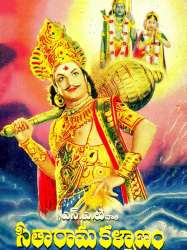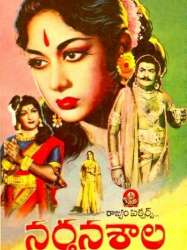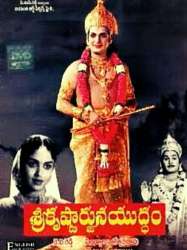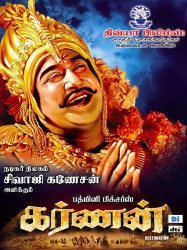Les films ayant le thème "Mythologie", triés par recette

Sampoorna Ramayanam (1961)
, 3h3Réalisé par Babubhai Mistry
Thèmes Mythologie, Religion
Acteurs Mahipal Singh, Anita Guha, Sulochana, Lalita Pawar, Helen Khan, Achala Sachdev

సీతారామ కళ్యాణం (1961)
Réalisé par N. Trivikrama Rao
Genres Drame, Musical
Thèmes Mythologie, Religion
Acteurs Haranath, Tadepalli Lakshmi Kanta Rao, Chittor V. Nagaiah, Chhaya Devi, B. Saroja Devi, Gummadi Venkateswara Rao
The story primary concentrates on Ravana, a key character in Ramayana. It begins with the birth of Lord Rama and ends with his Marriage with Seetha.

Les conquérants héroiques (1962)
, 1h35Réalisé par Giorgio Venturini
Origine France
Genres Drame, Guerre, Aventure, Historique
Thèmes Mythologie, Poésie, Mythologie grecque, Adaptation d'un poème, Dans la Grèce mythologique, Mythologie gréco-romaine
Acteurs Steve Reeves, Carla Marlier, Liana Orfei, Giacomo Rossi Stuart, Gianni Garko, Mario Ferrari
Après avoir fuit Troie, Enée trouve asile en Italie mais doit rapidement faire face à d'autres menaces...

Le Tyran de Syracuse (1962)
, 1h39Réalisé par Alberto Cardone, Curtis Bernhardt
Origine Italie
Genres Aventure, Historique, Péplum
Thèmes Mythologie, Mythologie grecque, Mythologie gréco-romaine
Acteurs Guy Williams, Ilaria Occhini, Liana Orfei, Arnoldo Foà, Carlo Giustini, Enrico Glori
À la mort du Protée, le chef de l'école pythagoricienne, Pythias est envoyé en Sicile chercher Arcanos pour lui succéder. Malgré les supplications de Nérissa, sa jeune femme enceinte, il se rend à Syracuse où le tyran Dionysus persécute les pythagoriciens, parce qu'ils prêchent la fraternité des hommes et menacent ainsi la hiérarchie sociale. À peine arrivé, Pythias est attaqué par Damon le chef des truands de la ville .….

Herakles (1962)
, 9minutesRéalisé par Werner Herzog
Genres Documentaire
Thèmes Mythologie, Mythologie grecque, Mythologie gréco-romaine

Vulcan, dieu du feu (1962)
, 1h20Genres Drame, Fantasy, Action
Thèmes Mythologie, Mythologie grecque, Mythologie gréco-romaine
Acteurs Gordon Mitchell, Annie Gorassini, Furio Meniconi, Roger Browne, Isarco Ravaioli, Edda Ferronao
Vénus, la déesse de l’amour, s’est enfuie de l’Olympe pour retrouver Adonis. Jupiter, dieu de l’Olympe, ne voit pas cela d’un bon œil et la marie avec Vulcain, dieu du feu. Mais Mars convoite également Vénus.

Raja Harishchandra (1913)
, 40minutesRéalisé par Dhundiraj Govind Phalke
Origine Inde
Genres Drame, Historique
Thèmes Mythologie, Religion, Sexualité, Homosexualité, Transsexuels et transgenres, Mythologie hindoue, LGBT, LGBT, Travestissement au cinéma
Acteurs D. D. Dabke or Dattatraya Damodar Dabke, Anna Salunke
Film mythologique inspiré du Mahabharata relatant la vie du roi Harishchandra. Ce roi noble et juste sacrifie d’abord son royaume, puis sa femme et ses enfants, pour honorer sa promesse au Sage Vishwamitra. À la fin, les dieux, satisfaits par sa haute valeur morale, lui rendent sa gloire passée.

Satyavadi Raja Harishchandra (1917)
, 16minutesRéalisé par Dhundiraj Govind Phalke
Genres Drame
Thèmes Mythologie, Religion
Acteurs D. D. Dabke or Dattatraya Damodar Dabke, Anna Salunke, Dhundiraj Govind Phalke
L'hommage au roi Harishchandra, qui a failli sacrifier son royaume pour son amour de la vérité, s'ouvre sur un tableau montrant le roi, son épouse Taramati et son jeune fils, à qui il enseigne le tir à l'arc. Ils partent à la chasse et le roi s'aventure dans une zone contrôlée par le sage Vishwamitra et son disciple Nakshatra. Pour expier son erreur, le roi est banni. Trois furies apparaissent prises dans les flammes qu'Harishchandra tente de sauver. Ils le séduisent et le poussent à renoncer à son royaume. Le roi endure de nombreuses épreuves avant qu'un dieu n'apparaisse à l'horizon pour rassurer tout le monde sur le fait qu'il s'agit simplement d'un test de l'intégrité du roi.

Lava Kusa (1963)
Réalisé par C. Pullaiah, C. S. Rao
Genres Fantasy
Thèmes Mythologie, Religion
Acteurs Anjali Devi, Suryakantam, Tadepalli Lakshmi Kanta Rao, Shobhan Babu, Chittor V. Nagaiah, Kaikala Satyanarayana
This movie is based on Uttara Kanda which is the later part of Ramayana written by Valmiki Maharshi. It depicts the lives of Lava and Kusa, the sons of Rama and Sita. The story depicts Sri Rama Pattabhishekam and about the brief period of Rama Rajyam, Rama sending Seeta exile on hearing the accusations of a washerman, Birth of Lava and Kusha, their visit to Ayodhya, Ashwamedha Yagna and conflict between Rama and his sons and Pattabhishekam of Lava and Kusha and Rama finally ending his Avatar.

Narthanasala (1963)
, 2h55Réalisé par Kamalakara Kameswara Rao
Genres Drame, Historique
Thèmes Mythologie, Religion
Acteurs Kommareddy Savitri, Samarla Venkata Ranga Rao, Shobhan Babu, Mikkilineni, Mukkamala Krishnamurthy, Dhulipala
This Hindu mythological film deals with the Viraata Parvam of the epic Mahabharata.

Sri Krishnarjuna Yudham (1963)
Réalisé par Kadiri Venkata Reddy
Thèmes Mythologie, Religion, Adaptation d'une pièce de théâtre
Acteurs Akkineni Nageswara Rao, Dhulipala, B. Saroja Devi, S. Varalakshmi, Dr. Prabhakar Reddy, Chittor V. Nagaiah
The story is a combination of Parijatapaharanam, Subhadra Parinayam and Gayopakhyanam sequences in Hindu epic Mahabharata.

Les Gladiatrices (1963)
, 1h35Réalisé par Antonio Leonviola, Tonino Ricci
Origine Italie
Genres Fantasy, Action, Aventure, Péplum
Thèmes Mythologie, Mythologie grecque, Mythologie nordique, Dans la Grèce mythologique, Mythologie gréco-romaine
Acteurs Joe Robinson, Harry Baird, Maria Fiore
Des Amazones mettent en esclavage les hommes d'un pays. Le héros Thor est appelé pour venir leur rendre leur liberté.

Karnan (1964)
, 3hRéalisé par B. R. Panthulu
Genres Drame, Biographie, Action, Historique
Thèmes Mythologie, Religion
Acteurs Sivaji Ganesan, Kommareddy Savitri, Ashokan, Devika, S. A. Ashokan, R. Muthuraman
Unmarried princess Kunti is blessed by the Sun god with a baby boy, which she abandons in the Ganges to avoid embarrassment. The boy is rescued and adopted by charioteer Athirathan, who names him Karnan. Years later, the now-grown up Karnan realises that Athirathan is only his adoptive father and feels heartbroken. He does not want to become a charioteer like Athirathan, and instead chooses to become a warrior. He masters archery and challenges the Pandava prince Arjuna in a contest. Karnan is insulted on account of his lowly birth, but the Kaurava prince and cousin of the Pandavas, Duryodhana, saves his pride, and gives him the kingdom of Anga. Karnan thus becomes the close friend of Duryodhana and his wife Bhanumati.

Satyawadi Raja Harishchandra (1917)
, 2hThèmes Mythologie, Religion
The Hindu sage Vishwamitra approaches king Harishchandra and informs him of a promise made by the king during the sage's dream to donate his entire kingdom. Being virtuous, Harishchandra immediately donates his entire kingdom to the sage and walks away with his wife Taramati and son Rohitashwa. As the entire world came to the control of the sage, after Harishchandra donated his kingdom, the king had to go to Varanasi, a holy town dedicated to Lord Shiva which was the only place outside the influence of the sage. As a part of donation, the sage claims an additional amount as "Dakshina" (honorarium) to be paid to complete the act of donation. As Harishchandra does not have anything left for himself, he sells his wife and son to a Brahmin family to pay for the Dakshina. However, the money collected was not sufficient enough for sage and then Harishchandra sells himself to the guard at the cremation ground.

Keechaka Vadham (1917)
Réalisé par R. Natajara Mudaliar
Thèmes Mythologie, Religion, Mythologie hindoue
Acteurs R. Natajara Mudaliar
Le film comme son script étant perdus, il n'existe pas de description précise du scénario de Keechaka Vadham. Il est cependant établi qu'il s'inspire fidèlement de l'épisode bien connu du public indien relaté dans le deuxième livre du Livre de Virata, le quatrième chant du Mahabharata attribué à Vyasa. Titré en sanskrit कीचकवधपर्वा (Kīcakavadha parva), littéralement « Le livre du meurtre de Kichaka », il raconte l'histoire suivante :
 Connexion
Connexion